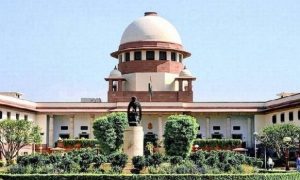Delhi CM Arvind Kejriwal will, however, remain behind bars as he was also arrested by the Central Bureau of Investigation on June 26 in connection with the corruption case linked to the Delhi liquor policy scam
The Supreme Court on Friday granted interim bail to Delhi chief minister Arvind Kejriwal after he challenged his arrest by the Enforcement Directorate in a money laundering case linked to the alleged excise policy scam in Delhi. He will, however, remain behind bars as he was also arrested by the Central Bureau of Investigation on June 26 in connection with the corruption case linked to the scam.
Read More: ‘Why Does Rahul Gandhi Hate Hindus So Much?’ BJP Hits Back At Congress Leader Over Ayodhya Barb
“We have not examined the question of bail but we have examined parameters of Section 19 of the PMLA (Prevention of Money Laundering Act). We have explained difference between Section 19 and Section 45. Section 19 is subjective opinion of officers and is subject to judicial review. Section 45 is exercise by court itself,” said Justice Sanjiv Khanna.
The SC bench, also comprising Justice Dipankar Datta, said it has sent “some issues” to a larger bench. On May 17, the apex court had reserved its verdict on Kejriwal’s plea while on April 15, it had sought a response from the ED on the AAP chief’s plea challenging his arrest in the money laundering case.
Read More: Assembly Bypoll Begins On 13 Assembly Seats Across 7 States Amid Tight Security, Result On July 13
Kejriwal has challenged in the SC the April 9 order of the Delhi High Court that had upheld his arrest in the case, saying there was no illegality about it and that the ED was left with “little option” after he skipped repeated summonses and refused to join the investigation.
The chief minister was arrested on March 21 by the ED in the money laundering case. On June 20, he was granted bail by a trial court on a personal bond of Rs 1 lakh in the case.
Read More: Maharashtra Parties Relocate MLAs to Hotels Ahead of Key Legislative Council Election
However, the ED had moved the Delhi HC the next day and contended that the trial court’s order granting bail to Kejriwal was “perverse”, “one-sided” and “wrong-sided” and that the findings were based on irrelevant facts. The court, on June 21, imposed an interim stay on the trial court’s bail order till passing of an order on ED’s application for interim relief. On June 25, the HC had passed a detailed order staying the trial court order.
The matter relates to alleged corruption and money laundering in the formulation and execution of the Delhi government’s excise policy for 2021-22, which has now been scrapped.





































